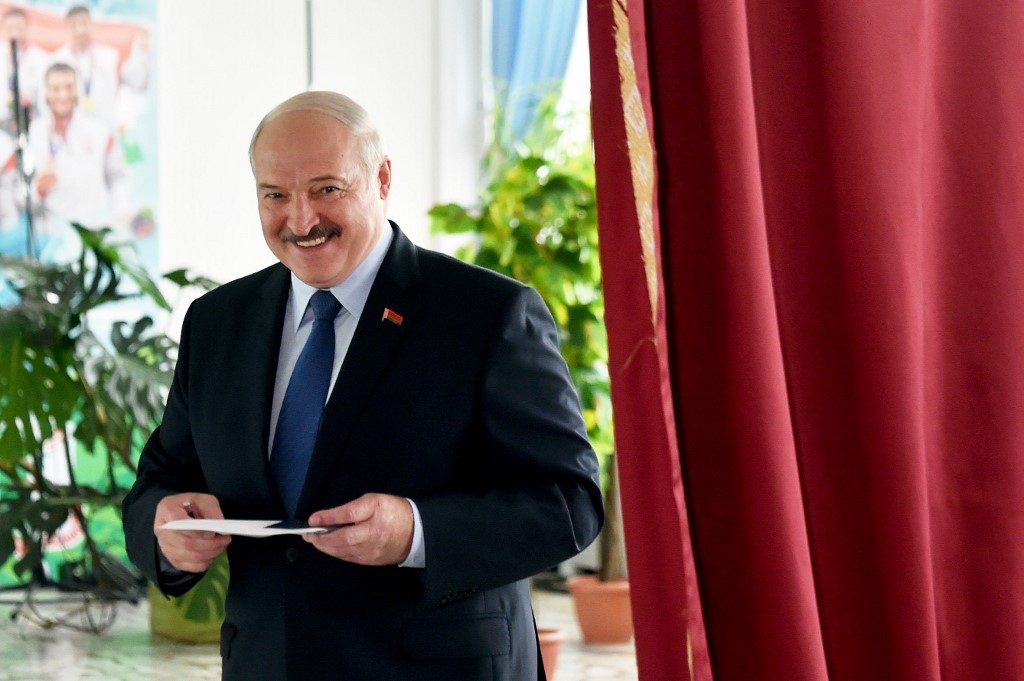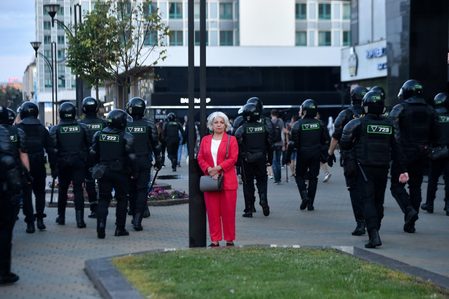SUMMARY
This is AI generated summarization, which may have errors. For context, always refer to the full article.

Strongman Alexander Lukashenko has ruled over ex-Soviet Belarus for nearly 3 decades and says he cannot bear to part with his “beloved” country.
The 65-year-old won a sixth term in August 9 polls, according to the official results, and brutally crushed protests by opponents who claim he rigged the vote.
Ordinary Belarusians and independent observers accuse him of stealing the election from 37-year-old Svetlana Tikhanovskaya, who has emerged as the leader of the protest movement against his rule.
Critics call the mustachioed leader “the cockroach.”
As Europe’s longest-serving non-royal leader, he has held onto power since 1994.
He detained his main opposition rivals ahead of Sunday’s poll and afterwards vowed he would not allow opponents to “tear the country apart.”
During an animated address to the nation last week, Lukashenko wiped sweat from his brow as he accused the opposition of planning mass riots in the capital Minsk.
“We will not give the country to you,” he said, speaking in front of a glum-faced audience of officials, church leaders, and military personnel.
He likened Belarus to a woman, saying “You don’t hand over your beloved.”
‘Why cry now?’
After post-election protests in which dozens were injured and a prominent rights group said that one man was killed, Lukashenko defended the use of force.
“Why weep and cry now?” he said.
A father of 3, Lukashenko often attends official events with his youngest son, 15-year-old Nikolai. His latest election declaration said that he is still legally married although he is never seen in public with the wife he wed in 1975.
He has insisted that Belarus is not ready for a woman leader.
A female president “would collapse, poor thing,” he said.
Amnesty International has accused Lukashenko’s government of “misogyny” and targeting female activists with discriminatory tactics.
Lukashenko has been known for his blunt-speaking folksiness and the former collective farm director is routinely pictured in rural settings like tractor factories or potato fields.
Despite tens of thousands of coronavirus infections, he has dismissed the pandemic as a hoax and refused to introduce a lockdown or postpone the election.
He has offered dubious tips on avoiding the virus, recommending driving tractors in the countryside, drinking vodka and taking steam baths.
Between Russia and West
Lukashenko has kept his landlocked homeland wedged between Russia and EU member Poland largely stuck in a Soviet time warp.
A quarter of a century after the collapse of the USSR the tightly controlled eastern European nation still has a security service called the KGB, adheres to a command economy, and looks to former master Moscow as its main ally, creditor, and energy provider.
But Lukashenko has not been afraid to cross swords with the Kremlin as he nervously eyed its intervention in neighboring Ukraine and has sought to mend fences with the West.
In February, he welcomed US Secretary of State Mike Pompeo, making the first visit to Belarus by a US Secretary of State since 1994.
Despite recurring financial crises Lukashenko has stood firmly by Soviet-era economic policies.
He has also signed the country up to the Eurasian Economic Union, Russian President Vladimir Putin’s pet project.
But while Belarus remains the most closely aligned former Soviet republic to Moscow, Lukashenko insists he is no Kremlin patsy, often switching from speaking Russian to Belarusian to show his independence.
When Putin seized Crimea from Ukraine and was accused of sparking a rebellion after the February 2014 ouster of Kiev’s Moscow-backed leader, Lukashenko appeared wary of Russia’s aggressiveness.
He has rejected the idea of outright unification with Russia and has accused Moscow of meddling in the current presidential campaign.
Less than two weeks before the polls Belarus arrested more than 30 Russian “militants,” saying they were on a mission to destabilize the country.
The arrests sparked a crisis in ties with Moscow, but after the widespread claims of blatant vote rigging Putin was quick to congratulate Lukashenko on his re-election.
By contrast, European governments questioned the results of Sunday’s election, with Belarus neighbour Poland calling for an emergency EU summit on the situation. – with reports from Agence France-Presse/Rappler.com
Add a comment
How does this make you feel?

There are no comments yet. Add your comment to start the conversation.